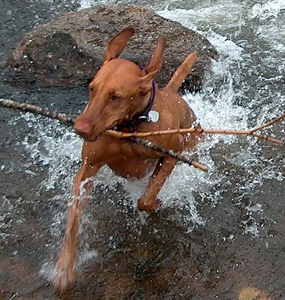Background:
The Vizsla is originally from Hungary: Hungarian drawings depict the Vizsla hunting alongside of the hawk. The Vizsla would drive a bird from the bush where the hawk would tackle it to the ground.
The Vizsla appears in the 1357 Illustrated Vienna Chronicle as ordered by King Louis the Great.
The Vizsla blood lines were carefully guarded by royalty for centuries due to their superior hunting traits. They were nearly made extinct as they had to endure the Turkish occupation of Hungary, the Hungarian Revolution, World War I, and World War II. They narrowly survived a complete takeover by English Pointers and German Shorthair Pointers in the 1800’s.
Fortunately the Vizsla made a comeback in Romania, Austria, Slovakia and Serbia. The first Vizsla was brought to America in 1950 when Frank Tallman and Emett Scanlan imported Sari from Rome. Sari arrived with two pups named Tito and Shasta. The AKC recognized the Vizsla in 1960.
Sizing up:
- Weight: 50 to 65 pounds
- Height: 21-24 inches
- Coat: Short
- Color: Solid golden-rust
- Life expectancy: 10-14 years

What’s he like?
The Vizsla’s an energetic, enthusiastic, high spirited dog. He’s a medium size hunter, a show dog and most importantly a people dog. He forms a fierce and unbreakable bond with his family. He’s friendly with children but won’t hesitate to play with them just as he would any other puppy.
Although he's a pointer by nature he has evolved to also be a retriever and with his high level of energy he could easily be tasked with a full day of hunting.
The Vizsla will stick as close to your side as you allow him to. He’d like to sleep in the same bed as his people and doesn’t like to be left alone. He might cry when things don’t go his way and will likely bark at strangers, making the Vizsla an effective watchdog.
During training it’s important to walk a fine line with the Vizsla. They won’t do well with harsh commands but will walk all over you if you let them.
The Vizsla thrives on daily exercise and could be destructive if not properly worked out.
Health:
The Vizsla is a healthy dog but might be more at risk for certain conditions than other breeds:
- Hip dysplasia
- Canine epilepsy
- Sebaceous adenitis
- Cancer
Take away points:
- The Vizsla is a natural hunter and might not do well with small pets
- The Vizsla is very energetic
- The Vizsla requires little grooming
- The Vizsla will stick to you like glue
If you have any questions or concerns, you should always visit or call your veterinarian – they are your best resource to ensure the health and well-being of your pets.

